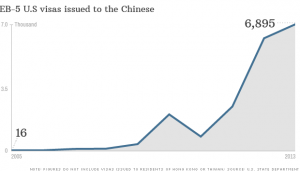Have you heard of EB-5 visa? This is a United States visa for immigrant investors. This was created by the Immigration Act of 1990 to stimulate the U.S. economy through job creation and capital investment by foreigners. To apply/obtain the visa, foreign investors must invest at least $ 1 million or $500,000 in a “Targeted Employment Area” (high unemployment or rural area). This program eventually provides green card to foreigners.
It seems like a lot of wealthy Chinese are now interested in obtaining this visa. According to CNNMoney, Chinese nationals account for more than 80% of visas issued, which was around 13% a decade ago. There has been a big increase in the number of EB-5 U.S. visas issued to the Chinese (from 16,000 in 2005 to 6,895,000 in 2013). The number of applicants is now so great that the U.S. government might run out of permits. Canada has a similar program but ended last month because it was too popular with Chinese.
Why are they trying to come to the U.S.? One reason is that the program offers green card. Green card offers a way to send children to the U.S. colleges and better quality of lives. Another reason is that the minimum investment cost is pretty low. Australia, for example, requires a 4.5$ million investment. This comparatively low cost attracts many Chinese.
However, there are plenty of critics. They argue that is it a “way for the global elite to buy U.S. citizenship.” This program certainly brings lots of foreign investment to the U.S. that may create lots of jobs. However, at the same time, isn’t this program encouraging a bigger gap between the rich and the poor? Also, do they think that life in China is not as good as the life in the U.S.?

While these visas are ethically and politically dubious, they probably do spur innovation.
well, one of the requirement is to invest at least #500,000 in either rural or high unemployment areas and hire people. I think they will certainly affect the U.S. economy (it may be small impact though). At the same time, I think the required investment is too low. USCIS should require much more investment in order to stimulate the U.S. economy.
Maybe I’m missing something here but I don’t really see what the issue is behind offering green cards to individuals investing in the US, especially when that investment is in low employment areas. While a higher investment criteria might be more efficient. As economists it seems like the ideal investment amount is one that optimizes the amount of funds going to low employment areas.
I also I agree with Kuveke, I don’t understand the issue with offering green cards to individuals who want to come to the US, especially if the are making investments in “Targeted Employment Areas” as the US continues its recover from the recession.
While they are making investments to obtain these green cards, is the united states creating unnecessary competition for colleges and jobs?
First, the 6 million number is for total visas, the vast majority of which are for tourism and for professionals to attend conferences. Second, how does a Chinese national buying an existing business help the US? Maybe the original founders can make out like bandits, and there are also people running scams against naive would-be purchasers of immigrant status. But a Chinese purchase of a shell company is hardly adding much on our end.